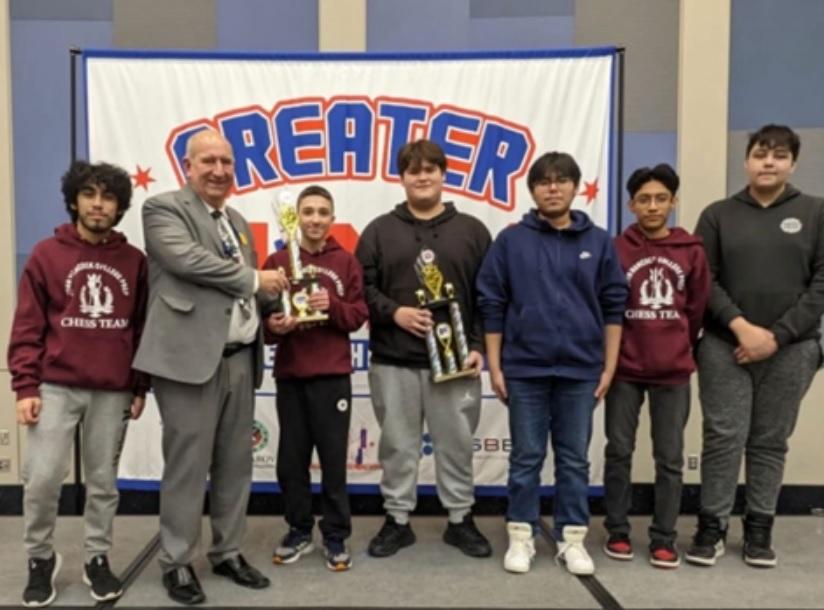By Hector Lopez
February 8, 2024
On February 3, the Hancock Chess team participated at McCormick Place for the K1-12 Greater Chicago Chess Championships finishing second among 800 teams. Photo: @CPSHancock
Chess is an intricate game and it’s often associated with intelligence.
Manuel Giron, chess coach and sponsor of the Hancock chess club and Hancock graduate believes chess can improve some aspects of being smart like memory, strategy, work ethic, mental fortitude. On the other hand, he thinks chess doesn’t measure intelligence. People can be good at chess and just not be an absolute genius, but they just need practice, he explains. He has seen many beginners who struggle to make moves with foresight behind them and those who struggle to keep a good mindset. On the contrary, the more experienced players are more willing to learn from mistakes, don’t put themselves down when they make mistakes, and have meaning and reason behind each move.
A freshman at Hancock, Daniel Walkosz has some experience with chess but describes himself closer to a beginner and says chess forces him to think in advance saying, “Yeah, it helps me plan ahead. And also plan ahead and focus on the whole topic.” Daniel also exposes the difficulty in chess where one move could send everything tumbling down. “And that's one of the main lessons in chess. One move can mess up your entire scheme,” he expresses. Chess forces the player to learn how to keep a level head and can be immensely challenging but rewarding.
An article from Chess.com called “How can chess actually make you smarter” investigated the methods and the way people can improve their intelligence if they play chess. The article states planning, creativity, memory, pattern recognition, active learning, and deliberate practice. The article uses quotes from reputable players who have professional experience like National Masters, abbreviated by NM which is awarded to players by national federations.
NM Bruce Pandolfini from the United States said, ”Playing chess fosters a long list of useful mental habits, such as drawing analogies and looking for patterns. Players,” he says, “become 'more philosophical in their approach to problems and life’s travails.' They also learn that regardless of their own feelings or desires, there is an objective reality to the game—and they learn the importance of seeing that reality from their opponent’s point of view, not just their own."
In addition, the article refers to experiments done in the past like in 2008 where chess players and non-chess players were given the "Tower of London” test that is used to measure planning and problem-solving skills. Chess players out performed non-chess players displaying how chess can improve these skills.
On Thursday November, November. 9 Hancock faced Acero-Garcia High School, Solorio Academy High School, and Kelly High School. Hancock went on to win 3-0 in the Southwest Side Quad Chess Tournament at Kelly High School.
This was written in Hancock’s Journalism class for the school newspaper, The Signature
